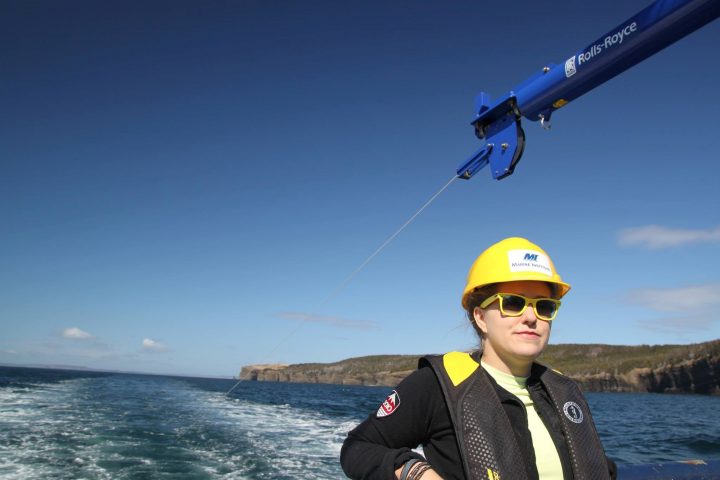News
Wednesday, June 14, 2017

When Sarah Walsh finished her bachelor of science with a focus in marine biology at Memorial in 2013, she wasn’t sure what her next move would be.
She did know, however, that ocean technology would be part of her future.
“During my science degree, I found myself gravitating towards technology, so I began searching for ocean technology programs,” she said.
“When I discovered the ocean mapping program at the Fisheries and Marine Institute, I was excited to learn it would allow me to use ocean technology while also discovering and exploring the ocean, relating back to my studies in marine biology.”
While she didn’t know much about sonar technology at the time, the more she researched, the more she became interested in the use of sound to detect objects on or under the surface of the water.
“Less than 10 per cent of the ocean has actually been mapped, which is very exciting and provides so many opportunities for those just entering the field,” she said.
“Plus, I was interested in learning about a technology that not many people know exists.”
The ocean mapping program combines both theory and practical learning — providing students with the opportunity to develop technical skills to collect, manage, analyze and disseminate ocean data.
Ms. Walsh says learning the theory behind how an instrument works and getting hands-on experience with an instrument “really helps” with understanding the technology.
“Spending time on the water during the technical sessions also gives you a chance to see if life at sea is right for you.”
Ms. Walsh also says she enjoyed the small class sizes and support from faculty and staff.
“They constantly push you to be your best self and really encourage you to go for what you want.”
Building on that in-class experience, she became an active member of the MI community.
She describes her 2016 Students on Ice Scholarship as the highlight, as the trip provided her with an opportunity to join students from all over the world for a journey through the Arctic.

A scene from Sarah Walsh’s Students on Ice excursion.
Ms. Walsh says Students on Ice isn’t just about teaching youth about climate change and the science behind it; it also teaches participants about culture and acceptance.
She also says her Students on Ice experiences unleashed a deeper desire for her to work towards a better understanding of climate change, particularly using her trained skills in marine biology and sonar technology.
“I’ve learned so much, especially about myself, and in turn it has directed me towards a new goal in life.”
During her time at MI, Ms. Walsh also volunteered with student recruitment and information sessions and became active with the campus gymnasium.
“MI helped me so much during my four years, so I wanted to tell others, in particular prospective students, about my experiences,” she said.
“Being involved with the gym kept me motivated and in shape, allowed me to meet some great people and eventually led to a student position.”
Ms. Walsh also became a volunteer with WISE NL, a non-profit organization which aims to increase women’s participation in science and engineering.
“I wanted to be a mentor with WISE because I had such a hard time trying to figure out my own path,” said Ms. Walsh.
“I wanted to be apart of this organization so I could help others find theirs.”
This past summer, Ms. Walsh completed a work term with the Canadian Hydrographic Service (CHS) at the Atlantic region in Dartmouth, N.S.
Building on the work term, she says she was able to obtain employment as a multidisciplinary hydrographer with CHS in St. John’s through the student bridging program.

Sarah Walsh in her element.
For the immediate future, she is focused on gaining more mapping experience and learning more about the exciting and growing field of ocean mapping.
This October, she will be a seafloor mapping intern with the Ocean Exploration Trust mapping the seafloor off the east coast of Mexico.
“With more experience, I will then achieve my ultimate career goal, which is to work in a role that will allow me to contribute to climate change research.”





